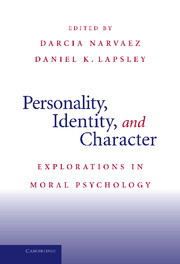Book contents
- Frontmatter
- Contents
- Contributors
- Introduction
- 1 The Moral Personality
- 2 The Moral Functioning of the Person as a Whole: On Moral Psychology and Personality Science
- 3 Moral Science? Still Metaphysical After All These Years
- 4 Cultural Pluralism and Moral Identity
- 5 Neuroscience and Morality: Moral Judgments, Sentiments, and Values
- 6 Triune Ethics Theory and Moral Personality
- 7 Early Foundations: Conscience and the Development of Moral Character
- 8 The Development of the Moral Personality
- 9 Urban Neighborhoods as Contexts for Moral Identity Development
- 10 Moral Personality Exemplified
- 11 Greatest of the Virtues? Gratitude and the Grateful Personality
- 12 The Elusive Altruist: The Psychological Study of the Altruistic Personality
- 13 Growing Toward Care: A Narrative Approach to Prosocial Moral Identity and Generativity of Personality in Emerging Adulthood
- 14 Moral Identity, Integrity, and Personal Responsibility
- 15 The Dynamic Moral Self: A Social Psychological Perspective
- 16 The Double-Edged Sword of a Moral State of Mind
- 17 Moral Identity in Business Situations: A Social-Cognitive Framework for Understanding Moral Functioning
- 18 The Moral Functioning of Mature Adults and the Possibility of Fair Moral Reasoning
- 19 Moral Personality: Themes, Questions, Futures
- Author Index
- Subject Index
11 - Greatest of the Virtues? Gratitude and the Grateful Personality
Published online by Cambridge University Press: 05 June 2012
- Frontmatter
- Contents
- Contributors
- Introduction
- 1 The Moral Personality
- 2 The Moral Functioning of the Person as a Whole: On Moral Psychology and Personality Science
- 3 Moral Science? Still Metaphysical After All These Years
- 4 Cultural Pluralism and Moral Identity
- 5 Neuroscience and Morality: Moral Judgments, Sentiments, and Values
- 6 Triune Ethics Theory and Moral Personality
- 7 Early Foundations: Conscience and the Development of Moral Character
- 8 The Development of the Moral Personality
- 9 Urban Neighborhoods as Contexts for Moral Identity Development
- 10 Moral Personality Exemplified
- 11 Greatest of the Virtues? Gratitude and the Grateful Personality
- 12 The Elusive Altruist: The Psychological Study of the Altruistic Personality
- 13 Growing Toward Care: A Narrative Approach to Prosocial Moral Identity and Generativity of Personality in Emerging Adulthood
- 14 Moral Identity, Integrity, and Personal Responsibility
- 15 The Dynamic Moral Self: A Social Psychological Perspective
- 16 The Double-Edged Sword of a Moral State of Mind
- 17 Moral Identity in Business Situations: A Social-Cognitive Framework for Understanding Moral Functioning
- 18 The Moral Functioning of Mature Adults and the Possibility of Fair Moral Reasoning
- 19 Moral Personality: Themes, Questions, Futures
- Author Index
- Subject Index
Summary
In gratitude for your good fortune, you must render in return some sacrifice of your own life for other life.
– Albert SchweitzerElizabeth Bartlett, professor of political science at a Midwestern university, received a heart transplant at the age of 42. All other options for treating her life-threatening chronic tachycardia (irregular heartbeat) had been exhausted. Four years earlier, she had suffered a cardiac arrest, and medication failed to improve her condition. In a book chronicling her journey, she describes the insufficiency of the gratitude she felt in the wake of her new lease on life:
Yet I have found that it is not enough for me to be thankful. I have a desire to do something in return. To do thanks. To give thanks. Give things. Give thoughts. Give love. So gratitude becomes the gift, creating a cycle of giving and receiving, the endless waterfall. Filling up and spilling over. To give from the fullness of my being. This comes not from a feeling of obligation, like a child's obligatory thank-you notes to grandmas and aunts and uncles after receiving presents. Rather, it is a spontaneous charitableness, perhaps not even to the giver but to someone else, to whoever crosses one's path. It is the simple passing on of the gift.
(Bartlett, 1997, p. 124)Gratitude in response to received goodness. It is a natural emotional reaction and quite likely a universal tendency to respond positively to another's benevolence. The word gratitude is derived from the Latin gratia, meaning favor, and gratus, meaning pleasing.
- Type
- Chapter
- Information
- Personality, Identity, and CharacterExplorations in Moral Psychology, pp. 256 - 270Publisher: Cambridge University PressPrint publication year: 2009
- 7
- Cited by



